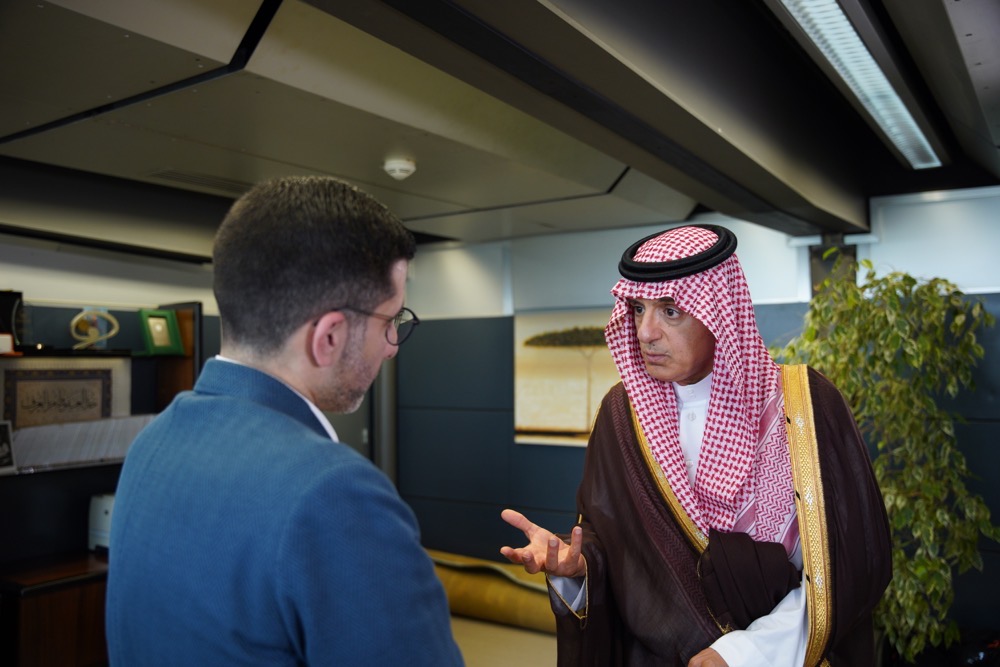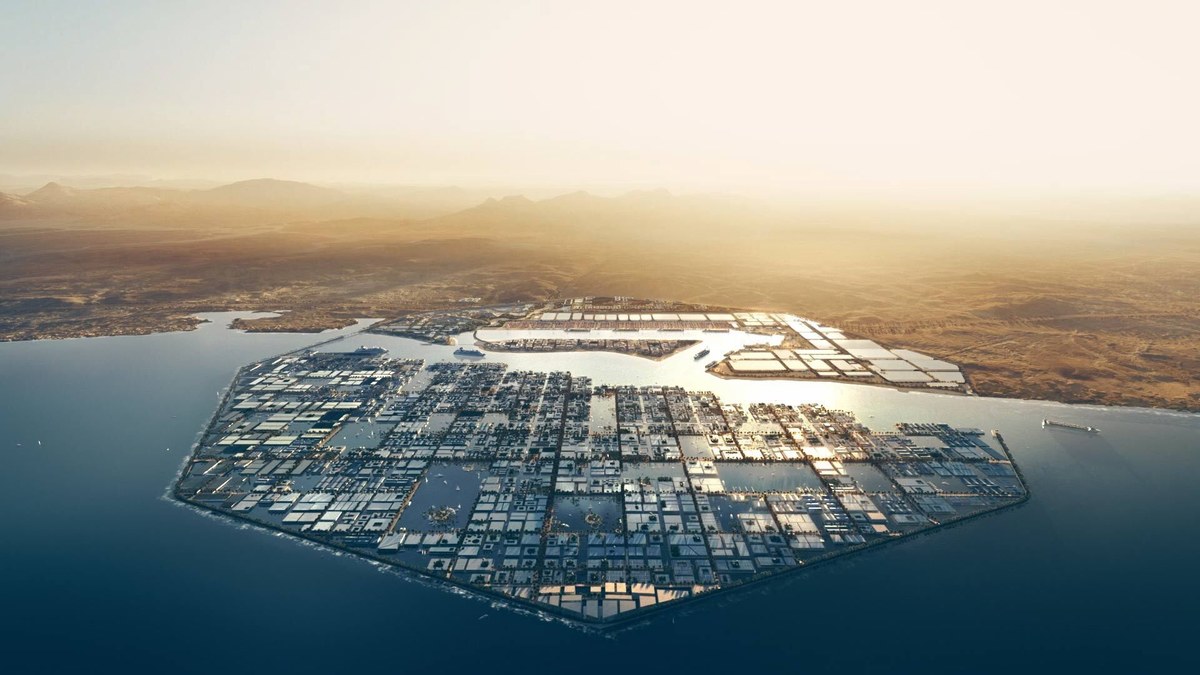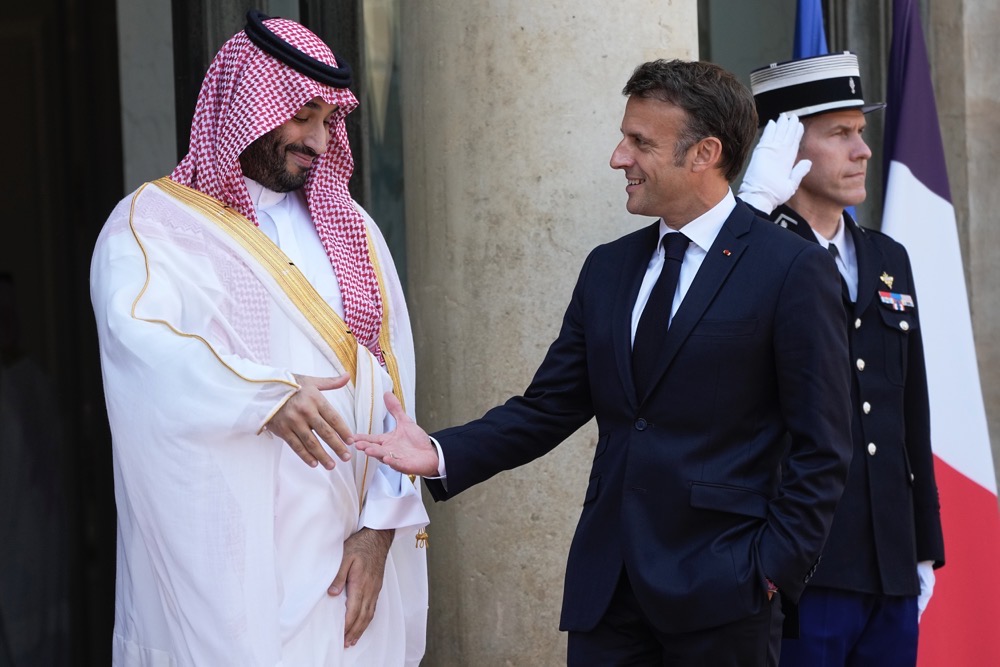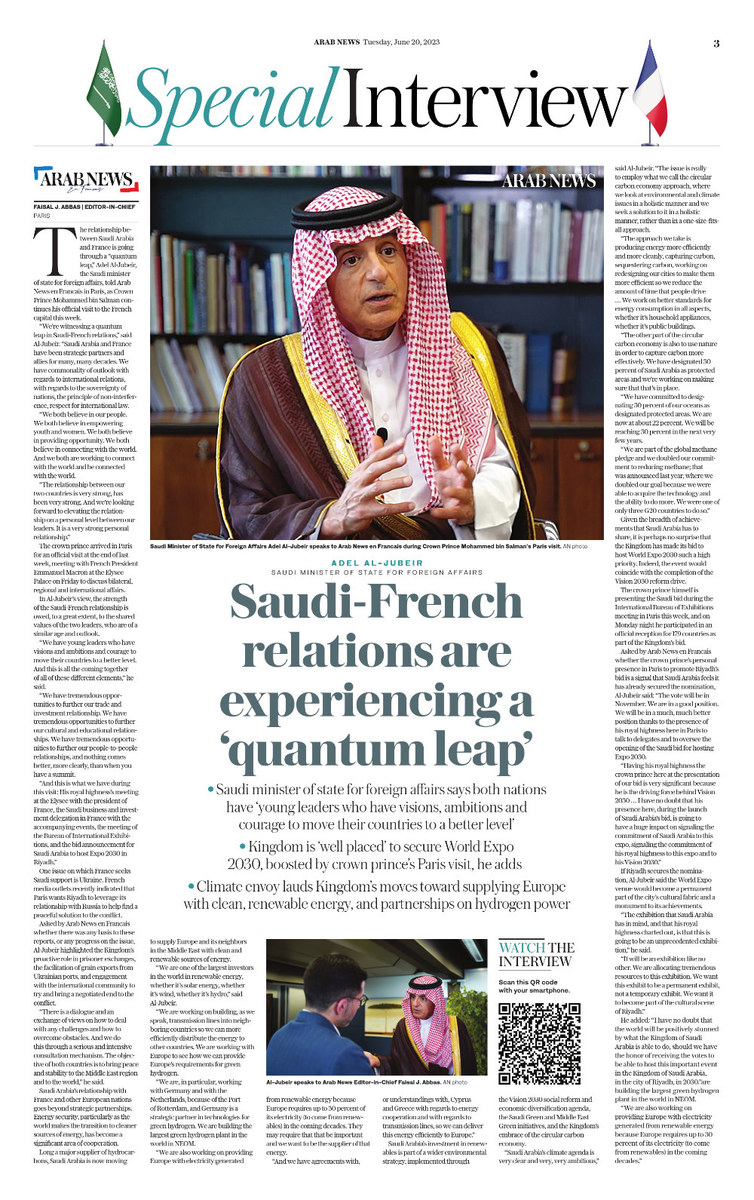PARIS: The relationship between Saudi Arabia and France is going through a “quantum leap,” Adel Al-Jubeir, the Saudi minister of state for foreign affairs, told Arab News en Francais in Paris, as Crown Prince Mohammed bin Salman continues his official visit to the French capital this week.
“We’re witnessing a quantum leap in Saudi-French relations,” said Al-Jubeir. “Saudi Arabia and France have been strategic partners and allies for many, many decades. We have commonality of outlook with regards to international relations, with regards to the sovereignty of nations, the principle of non-interference, respect for international law.
“We both believe in our people. We both believe in empowering youth and women. We both believe in providing opportunity. We both believe in connecting with the world. And we both are working to connect with the world and be connected with the world.
“The relationship between our two countries is very strong, has been very strong. And we’re looking forward to elevating the relationship on a personal level between our leaders. It is a very strong personal relationship.”
The crown prince arrived in Paris for an official visit at the end of last week, meeting with French President Emmanuel Macron at the Elysee Palace on Friday to discuss bilateral, regional and international affairs.
In Al-Jubeir’s view, the strength of the Saudi-French relationship is owed, to a great extent, to the shared values of the two leaders, who are of a similar age and outlook.
“We have young leaders who have visions and ambitions and courage to move their countries to a better level. And this is all the coming together of all of these different elements,” he said.
“We have tremendous opportunities to further our trade and investment relationship. We have tremendous opportunities to further our cultural and educational relationships. We have tremendous opportunities to further our people-to-people relationships, and nothing comes better, more clearly, than when you have a summit.

Crown Prince Mohammed bin Salman attended the Kingdom’s official reception for Expo 2030 bid on Monday. (SPA)
“And this is what we have during this visit: His royal highness’s meeting at the Elysee with the president of France, the Saudi business and investment delegation in France with the accompanying events, the meeting of the Bureau of International Exhibitions, and the bid announcement for Saudi Arabia to host Expo 2030 in Riyadh.”
One issue on which France seeks Saudi support is Ukraine. French media outlets recently indicated that Paris wants Riyadh to leverage its relationship with Russia to help find a peaceful solution to the conflict.
Asked by Arab News en Francais whether there was any basis to these reports, or any progress on the issue, Al-Jubeir highlighted the Kingdom’s proactive role in prisoner exchanges, the facilitation of grain exports from Ukrainian ports, and engagement with the international community to try and bring a negotiated end to the conflict.
“There is a dialogue and an exchange of views on how to deal with any challenges and how to overcome obstacles. And we do this through a serious and intensive consultation mechanism. The objective of both countries is to bring peace and stability to the Middle East region and to the world,” he said.
Saudi Arabia’s relationship with France and other European nations goes beyond strategic partnerships. Energy security, particularly as the world makes the transition to cleaner sources of energy, has become a significant area of cooperation.
Long a major supplier of hydrocarbons, Saudi Arabia is now moving to supply Europe and its neighbors in the Middle East with clean and renewable sources of energy.
“We are one of the largest investors in the world in renewable energy, whether it’s solar energy, whether it’s wind, whether it’s hydro,” said Al-Jubeir.
“We are working on building, as we speak, transmission lines into neighboring countries so we can more efficiently distribute the energy to other countries. We are working with Europe to see how we can provide Europe’s requirements for green hydrogen.
“We are, in particular, working with Germany and with the Netherlands, because of the Port of Rotterdam, and Germany is a strategic partner in technologies for green hydrogen. We are building the largest green hydrogen plant in the world in NEOM.
“We are also working on providing Europe with electricity generated from renewable energy because Europe requires up to 30 percent of its electricity (to come from renewables) in the coming decades. They may require that that be important and we want to be the supplier of that energy.
“And we have agreements with, or understandings with, Cyprus and Greece with regards to energy cooperation and with regards to transmission lines, so we can deliver this energy efficiently to Europe.”

Saudi Minister of State for Foreign Affairs Adel Al-Jubeir being interviewed by Arab News Editor-in-Chief Faisal J. Abbas in Paris on Monday. (AN photo )
Saudi Arabia’s investment in renewables is part of a wider environmental strategy, implemented through the Vision 2030 social reform and economic diversification agenda, the Saudi Green and Middle East Green initiatives, and the Kingdom’s embrace of the circular carbon economy.
“Saudi Arabia’s climate agenda is very clear and very, very ambitious,” said Al-Jubeir. “The issue is really to employ what we call the circular carbon economy approach, where we look at environmental and climate issues in a holistic manner and we seek a solution to it in a holistic manner, rather than in a one-size-fits-all approach.
“The approach we take is producing energy more efficiently and more cleanly, capturing carbon, sequestering carbon, working on redesigning our cities to make them more efficient so we reduce the amount of time that people drive … We work on better standards for energy consumption in all aspects, whether it’s household appliances, whether it’s public buildings.
“The other part of the circular carbon economy is also to use nature in order to capture carbon more effectively. We have designated 30 percent of Saudi Arabia as protected areas and we’re working on making sure that that’s in place.

The NEOM Green Hydrogen plant is expected to begin green hydrogen production using 100 percent renewables in 2026. (NEOM)
“We have committed to designating 30 percent of our oceans as designated protected areas. We are now at about 22 percent. We will be reaching 30 percent in the next very few years.
“We are part of the global methane pledge and we doubled our commitment to reducing methane; that was announced last year, where we doubled our goal because we were able to acquire the technology and the ability to do more. We were one of only three G20 countries to do so.”
Given the breadth of achievements that Saudi Arabia has to share, it is perhaps no surprise that the Kingdom has made its bid to host World Expo 2030 such a high priority. Indeed, the event would coincide with the completion of the Vision 2030 reform drive.
The crown prince himself is presenting the Saudi bid during the International Bureau of Exhibitions meeting in Paris this week, and on Monday night he participated in an official reception for 179 countries as part of the Kingdom’s bid.
Asked by Arab News en Francais whether the crown prince’s personal presence in Paris to promote Riyadh’s bid is a signal that Saudi Arabia feels it has already secured the nomination, Al-Jubeir said: “The vote will be in November. We are in a good position. We will be in a much, much better position thanks to the presence of his royal highness here in Paris to talk to delegates and to oversee the opening of the Saudi bid for hosting Expo 2030.

The crown prince met French President Emmanuel Macron at the Elysee Palace on Friday to discuss bilateral, regional and international affairs. (AP)
“Having his royal highness the crown prince here at the presentation of our bid is very significant because he is the driving force behind Vision 2030 … I have no doubt that his presence here, during the launch of Saudi Arabia’s bid, is going to have a huge impact on signaling the commitment of Saudi Arabia to this expo, signaling the commitment of his royal highness to this expo and to his Vision 2030.”
If Riyadh secures the nomination, Al-Jubeir said the World Expo venue would become a permanent part of the city’s cultural fabric and a monument to its achievements.
“The exhibition that Saudi Arabia has in mind, and that his royal highness charted out, is that this is going to be an unprecedented exhibition,” he said.
“It will be an exhibition like no other. We are allocating tremendous resources to this exhibition. We want this exhibit to be a permanent exhibit, not a temporary exhibit. We want it to become part of the cultural scene of Riyadh.”
He added: “I have no doubt that the world will be positively stunned by what the Kingdom of Saudi Arabia is able to do, should we have the honor of receiving the votes to be able to host this important event in the Kingdom of Saudi Arabia, in the city of Riyadh, in 2030.”


































